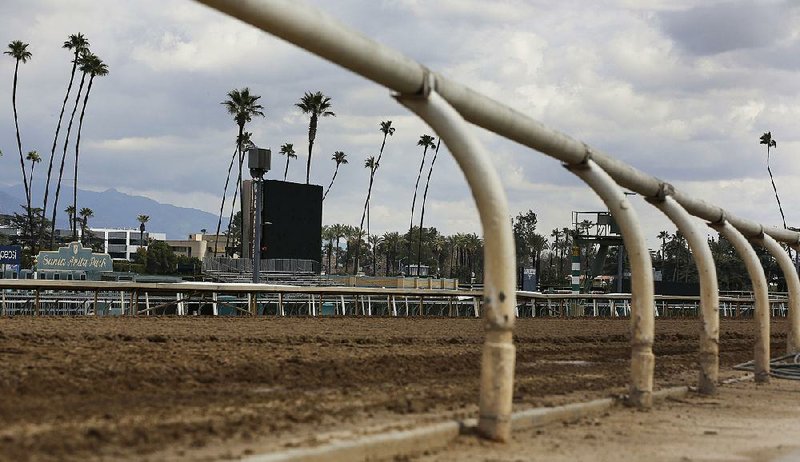LOS ANGELES -- The surge in catastrophic breakdowns by horses at Santa Anita that has defied explanation and roiled the sport continued Thursday morning.
The day after the track reopened for training, Princess Lili B broke both front legs at the end of a half-mile workout and was euthanized. The loss of the 3-year-old filly was the 22nd racing- or training-related horse death at the track since Dec. 26.
A few hours after she was euthanized, the track's owners banned the use of all race-day medication and restricted whip use in the latest attempt to stop the deaths. The medication decision, which will bring the track into alignment with standards established by the International Federation of Horseracing Authorities, is believed to be without precedent in North American racing.
"We have arrived at a watershed moment," Belinda Stronach, chairman and president of track owner the Stronach Group, wrote in an open letter.
"There are some who will take a stand and tell you that it cannot be done," Stronach continued. "To them we say 'the health and welfare of the horses will always come first.' ... The time to discuss 'why' these advancements must take place is over. The only thing left to discuss is 'how.'"
The new requirements will also be in effect at Stronach-owned Golden Gate Fields in Berkeley.
David Bernstein, owner and trainer of Princess Lili B, said she broke down just past the finish line after her workout.
Bernstein told KTLA-TV that Princess Lili B apparently took a step as she changed leads, which led to her breaking her left ankle and then her right ankle. A lead change refers to which set of legs, left or right, leads or advances forward when a horse is galloping.
"She was always very sound and we've never had a problem with her," Bernstein said in the interview. "We didn't have to train her on any medication. She's just a lovely filly to be around."
Rick Baedeker, executive director of the California Horse Racing Board, expects other tracks in the state to follow the lead of Santa Anita, where racing is scheduled to resume March 22, and Golden Gate Fields. Any new requirements passed by the CHRB wouldn't take effect until the summer at the earliest.
Virtually every country outside North America bans the use of medication on race day. That includes furosemide, better known as Lasix, which is supposed to lessen the risk of exercise-induced pulmonary hemorrhage. The drug is so common at U.S. tracks that results sheets note which horses were injected.
According to data compiled by the Jockey Club, only 3.6 percent of the 279,774 starts in the U.S. last year were made by horses without Lasix.
"American racing is a bit of a lone ranger internationally," said Kenny McPeek, a thoroughbred trainer in Kentucky whose 19 wins with non-Lasix horses last year were the most in the U.S.
The drug is a potent diuretic that causes a horse to urinate 15 to 20 liters in the hours before a race.
At least 19 of the 22 horses who have died at Santa Anita in the recent spike used Lasix, according to Equibase. Records for the three remaining horses weren't available because they hadn't participated in a race.
In addition to banning Lasix, the Stronach Group said it would strengthen rules on a variety of issues including legal painkillers, anabolic steroids and shock wave therapy. The company also pledged "complete transparency" in veterinary records and increased drug testing outside competition.
As the drama played out at Santa Anita on Thursday, members of Congress moved to bring increased oversight to the sport. Rep. Andy Barr (R-Ky.) and Rep. Paul Tonko (D-N.Y.) reintroduced the Horseracing Integrity Act, a measure that would ban the use of medication in the 24 hours before a race and introduce national standards for horse racing to replace the hodgepodge of regulations from the 38 state racing commissions.
The bill would create a private, independent authority -- the Horseracing Anti-Doping and Medication Control Authority -- responsible for developing and administering a nationwide anti-doping and medication control program for the sport.
Sports on 03/15/2019
